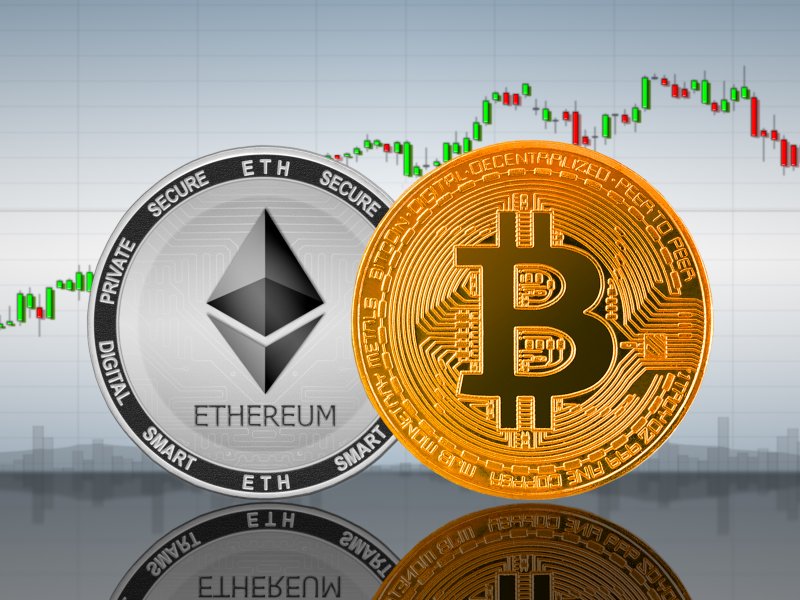Bitcoin (BTC) and Ether (ETH), the native cryptocurrency of the Ethereum blockchain platform, are the two most popular coins in the crypto landscape. With a market cap of about $380 billion, BTC, even with its 57% tumble year to date through Sept. 15, trades at around $19,700 with a typical 24-hour trading volume in the tens of billions of dollars.
On the other hand, ETH has a market cap of about $180 billion. It’s trading around $1,500, with a typical 24-hour trading volume in the tens of billions of dollars.
The supply of coins in circulation influences these numbers as well. ETH has 122.4 million coins in circulation, while BTC has only 19.2 million. In general, reduced supply can push up prices.
For many investors, the question remains: Which is the better buy, Bitcoin or Ethereum? “In some senses, they’re similar in that they have this sort of currency feature to them,” says Bryan Routledge, associate professor of finance at the Tepper School of Business at Carnegie Mellon University. But the main difference between Bitcoin and Ethereum is the use case. Bitcoin is mainly known as a store of value, and Ethereum supports smart contracts and secure financial transactions.

What Are the Differences Between Bitcoin and Ethereum?
The newest difference between Bitcoin and Ethereum has arisen after the Ethereum “Merge” was completed on Sept. 15 (more on that later). Previously, both cryptocurrencies used the proof-of-work, or PoW, to validate transactions and secure the blockchain. BTC still uses PoW, but Ethereum’s long-awaited Merge moved the network to a proof-of-stake, or PoS, tool.
One immediate implication for the Ethereum network is that its energy usage is expected to drop by more than 99% following the shift to PoS. One of the biggest criticisms of cryptocurrency has been its massive carbon footprint and high energy demand, an issue ETH has now directly addressed, and Bitcoin has not.
The two cryptocurrencies’ utilities are defined by the problems they are trying to solve. Routledge says he likes to think of Bitcoin as digital gold. “It’s not intrinsically useful,” he says, “but it seems to have value,” and it’s an alternative to the financial status quo. Ethereum, he says, is like owning a barrel of oil. He says that “it’s not just a hedge against gasoline prices; it’s also useful in that you can refine it.” This way, Ethereum has a different use case: developing services on the Ethereum network.
One important thing to consider about Bitcoin’s current appeal, aside from being the world’s first cryptocurrency, “is that its formative years coincided with two historical economic crises,” says Adam Sze, head of digital assets at ETF provider Global X. “These crises highlighted two of the biggest issues with the traditional financial ecosystem: mistrust and inaccessibility.” According to Sze, Bitcoin solves these problems by being a decentralized network that allows participants to exchange value globally without a governing body or financial intermediary. Not to mention that all that’s needed to participate is an internet connection.

Ethereum’s ‘Merge’ and What It Means for Investors
Ethereum completed its “Merge” mid-September 2022, transitioning the network from proof-of-work to proof-of-stake.
Ethereum is moving to proof-of-stake means that instead of using computing power to finalize the blockchain, developers must have a certain amount of Ether coin for their block to be approved. “Proof-of-work has been successful and got Bitcoin off the ground, but now that crypto is a billion-dollar industry, it needs to do better,” Routledge says.
Investors should remember that moving from one legacy system to another is complex, and Ozair expects a few hiccups along the way. “Hopefully, nothing that will cost people a lot of money,” she says, but the truth is that nobody can be sure about that.
Hougan says three things will happen as a result of the switch:
- The Merge will reduce the new Ether produced yearly by about 70% to 75%.
- It will cut Ethereum’s carbon emissions by 99% or more.
- Crypto will appeal to investors sensitive to environmental, social, and governance factors, or ESG.
He believes the market might also “see institutional money flow into ETH as a result.”
Curiously, in the hours after the Merge on Sept. 15, the ETH price fell, although there’s little reason to believe that the switch to proof-of-stake will be a long-term negative for ETH prices.
Bitcoin vs. Ethereum:
So, which is the better investment: Bitcoin or Ethereum? Ozair says she believes Bitcoin will always be valuable just because it was first. She says Ethereum has its problems but also has a lot of potentials.
Hougan believes “Ethereum is the crypto asset of choice for the next 12 months.” But the Merge isn’t going to be the last upgrade for Ethereum, he adds. “The expectation is that in the next few years, Ethereum will go through another series of upgrades that will give it the ability to increase transactions by about 1,000-fold,” he says.
From a practical standpoint, investors need to build themselves a well-diversified portfolio, Routledge says. He adds that now or in the future, that portfolio might very well have a place for Bitcoin and Ethereum.
Source
https://money.usnews.com/investing/cryptocurrency/articles/bitcoin-vs-ethereum-which-is-a-better-buy
Disclaimer
Although the material contained in this website was prepared based on information from public and private sources that ampraider.com believes to be reliable, no representation, warranty, or undertaking, stated or implied, is given as to the accuracy of the information contained herein, and ampraider.com expressly disclaims any liability for the accuracy and completeness of the information contained in this website.

